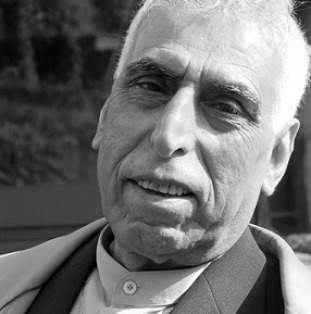|

1934-2021
Khaled Mattawa
On Saturday June 12th, at 4:10 a.m. Saadi Youssef, the great Iraqi poet, passed away at his home in the village of Harefield outside of London. Saadi will be buried at Highgate Cemetery in North London.
A towering figure in Arabic letters, Youssef was born in the village of Abi al-Khasib, Basra Governorate, Iraq in 1934. He completed his secondary studies in the city of Basra and graduated from the Teachers' College of Baghdad in 1954, with B.A. (Honors) in Arabic Literature. He worked as a teacher early on, and later in literary journalism, but was mostly devoted to life of writing.
Youssef joined the Iraqi Communist Party in his youth and considered himself a communist throughout his life, a dedication that landed him in prison several times. In the mid-fifties he traveled to Moscow to attend a youth forum, which made his return to Iraq dangerous, thus leading to move to Kuwait where he taught for two years. He returned to Iraq with the 1958 revolution, and in 1963 the Ba'athists imprisoned him when they seized power. After his release from prison in 1964, Youssef traveled to Algeria and worked a teacher in the city of Sidi Belabbas for several years.
It was in that period of his life that the prominent features of Youssef's poetic style began to gain notice in the Arab world. His work was distinguished by its precise imagery, transparency and restraint, foregoing the high rhetorical and ideologically laden poetry written in Arabic at the time. Youssef’s poetry focused on personal experiences and impressions of daily life, which was in contrast to the intense modernist symbolism and the precepts of committed literature, which were the two dominant poetic movements in the Arab world then. Saadi’s poetry also challenged the strict rules of traditional poetry, preferring the taf’ila (verse libre) the and the nathr prose poem. With this poetic innovations and his deeply imagistic portrayals of life in the Middle East, North Africa, and in exile, Youssef's poetic style became a major influence in contemporary Arabic poetry, alongside Adonis, Nizar Qabbani and Mahmoud Darwish, his more open approach leading him to be recognized as a poet’s poet among later generations of writers.
Youssef returned to Iraq in the early 1970s and left at the end of the decade when Saddam Hussein came to power. In the decades that followed, Youssef found himself moving between Damascus and Beirut; then Cyprus, Yemen and Tunisia after the PLO left Lebanon, followed by a few years in Paris and Amman. In 1999, Saadi moved to London, where he has lived in a retirement community in Harefiled (Oxbridge) for more than two decades.
Saadi Youssef has published more than 40 collections of poetry, the most important of which are Qasai’d Mari’iyah (Visible Poems) published in 1969, L’Akhdar Ben Youssef wa Mashaghilihi (L’Akhdar Ben Youssef and His Concerns) 1971, and Ashjaru Ithaka (The Trees of Ithaca) 1992. He has published a dozen works of prose ranging from fiction, criticism, and memoir.
Youssef is also one of the most important and prolific translators to Arabic, with a list of translations that exceeds forty works that include the poetry of Walt Whitman, Federico Garcia -Lorca, Yannis Ritsos and Constantine Cavafy, and novels by Ngugi wa Thiongo, Wole Soyinka, Kenzaboro Aoi and George Orwell. Youssef's poetic works have been translated into English, French, German and Italian. Two volumes of Saadi Yousef have appeared in English published by Graywolf Press, Without an Alphabet, Without a Face, translated by Khaled Mattawa (2002), and Nostalgia, My Enemy, translated by Peter Money and Sinan Antoon (2012).
Youssef won several international prizes in poetry: the Sultan bin Ali Al Owais Prize, which was later withdrawn for his criticism of the UAE, the Cavafy Prize from the Hellenic Society of Greece, the Arkana prize from Poets House of Morocco, and the Blue Metropolis Arab Literary Prize (Montreal, Canada). He also served as a member of the boards of many Arab and international cultural institutions, including Al-Thaqafa al-Jadida, Banipal Magazine, and the International PEN Club.
Saadi Youssef is survived by his wife, Iraqi actress and critic Ikbal Kadom, his two daughters Maryam and Shiraz, and three granddaughters Nadia, Nadine and Marquetta.
|